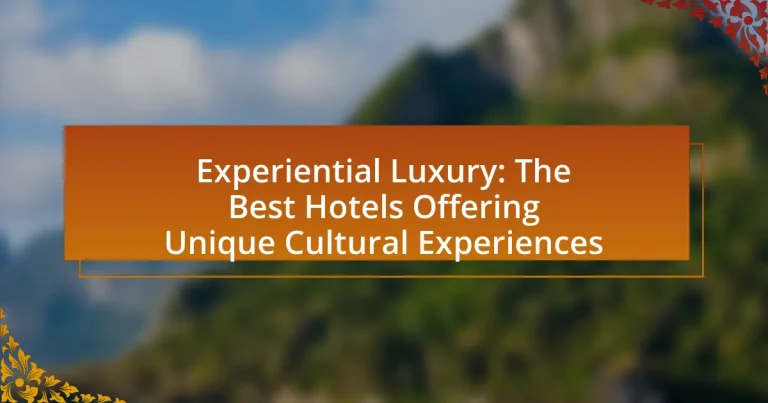Experiential luxury in hotels emphasizes unique, immersive experiences over traditional luxury amenities, focusing on personalized services and cultural engagement. This article explores the characteristics of experiential luxury hotels, highlighting their commitment to authentic local experiences, such as cooking classes and guided tours. It also examines the importance of cultural immersion, the role of cuisine in enhancing guest experiences, and provides examples of renowned hotels that excel in offering these unique cultural interactions. Additionally, the article offers guidance on selecting the right experiential luxury hotel and tips for maximizing the cultural engagement during a stay.

What is Experiential Luxury in the Context of Hotels?
Experiential luxury in the context of hotels refers to a hospitality approach that prioritizes unique, immersive experiences over traditional luxury amenities. This concept emphasizes personalized services, cultural engagement, and authentic local experiences, allowing guests to connect deeply with their surroundings. For instance, hotels that offer cooking classes with local chefs or guided tours of historical sites exemplify experiential luxury by providing guests with memorable interactions that enrich their stay. Research indicates that 70% of luxury travelers seek experiences that reflect local culture, highlighting the growing demand for such offerings in the hospitality industry.
How does Experiential Luxury differ from Traditional Luxury?
Experiential luxury differs from traditional luxury primarily in its focus on unique experiences rather than material possessions. Traditional luxury emphasizes high-quality goods, such as designer clothing or expensive cars, which signify status through ownership. In contrast, experiential luxury prioritizes memorable activities and immersive experiences, such as exclusive travel adventures or personalized cultural interactions, which create lasting emotional connections. This shift is supported by research indicating that consumers increasingly value experiences over possessions, with a study by the Journal of Consumer Research showing that experiences contribute more significantly to long-term happiness than material goods.
What are the key characteristics of Experiential Luxury hotels?
Experiential Luxury hotels are characterized by personalized service, immersive cultural experiences, and unique design elements that reflect local heritage. These hotels prioritize guest engagement through tailored activities, such as cooking classes with local chefs or guided tours of nearby historical sites, enhancing the overall travel experience. Additionally, they often feature high-quality amenities and exceptional attention to detail, ensuring comfort while fostering a deep connection to the destination. This approach aligns with the growing consumer demand for authentic and meaningful travel experiences, as evidenced by a report from the Luxury Institute, which highlights that 70% of luxury travelers seek experiences over material goods.
Why is cultural immersion important in Experiential Luxury?
Cultural immersion is important in experiential luxury because it enhances the authenticity and depth of the luxury experience. Engaging with local customs, traditions, and lifestyles allows travelers to connect meaningfully with their destination, transforming a standard luxury stay into a memorable journey. Research indicates that 70% of luxury travelers prioritize authentic experiences that reflect the local culture, as these experiences foster a sense of belonging and personal enrichment. This connection not only elevates the overall satisfaction of the traveler but also supports local communities and economies, making cultural immersion a vital component of experiential luxury.
What types of unique cultural experiences do these hotels offer?
These hotels offer unique cultural experiences such as immersive local cuisine classes, traditional craft workshops, and guided cultural tours. For instance, guests can participate in cooking classes that teach regional dishes, enhancing their culinary skills while learning about local ingredients and cooking techniques. Additionally, many hotels provide opportunities to engage with local artisans through workshops, allowing guests to create traditional crafts, which fosters a deeper understanding of the region’s cultural heritage. Guided tours often include visits to historical sites and cultural landmarks, providing context and storytelling that enrich the travel experience. These offerings not only enhance guest engagement but also promote cultural preservation and appreciation.
How do local traditions influence the guest experience?
Local traditions significantly enhance the guest experience by providing authentic cultural immersion. When hotels incorporate local customs, cuisine, and rituals into their services, guests gain a deeper understanding of the destination’s heritage. For instance, a hotel in Japan may offer traditional tea ceremonies, allowing visitors to engage with Japanese culture directly. This not only enriches the stay but also fosters a sense of connection and appreciation for the locale. Studies show that travelers increasingly seek experiences that reflect local culture, with 70% of tourists expressing a desire for authentic interactions during their trips. Thus, local traditions play a crucial role in shaping memorable and meaningful guest experiences.
What role does cuisine play in cultural experiences at luxury hotels?
Cuisine plays a pivotal role in shaping cultural experiences at luxury hotels by offering guests an authentic taste of local traditions and culinary heritage. Luxury hotels often curate their dining options to reflect the regional flavors and ingredients, enhancing the overall guest experience. For instance, hotels may collaborate with renowned local chefs or incorporate traditional cooking methods, allowing guests to engage with the culture through food. This approach not only elevates the dining experience but also fosters a deeper connection to the destination, as evidenced by the increasing trend of hotels featuring farm-to-table concepts and local culinary events that celebrate indigenous cuisines.

Which Hotels are Renowned for Their Experiential Luxury Offerings?
Hotels renowned for their experiential luxury offerings include the Four Seasons Resort Bali at Sayan, which provides immersive cultural experiences such as Balinese cooking classes and traditional dance performances. Another example is the Aman Tokyo, known for its blend of modern luxury and Japanese culture, offering unique experiences like Zen meditation sessions and private tea ceremonies. Additionally, the Ritz-Carlton, Kyoto, emphasizes local culture through its curated experiences, including guided tours of historic temples and seasonal kaiseki dining. These hotels are recognized for their commitment to providing guests with authentic and enriching experiences that reflect the local culture and environment.
What are some examples of hotels that provide unique cultural experiences?
Some examples of hotels that provide unique cultural experiences include the Aman Tokyo, which offers a blend of traditional Japanese aesthetics and modern luxury, allowing guests to engage with local culture through activities like tea ceremonies. Another example is the Four Seasons Resort Bali at Sayan, where visitors can participate in Balinese cooking classes and traditional ceremonies, immersing themselves in the local customs. Additionally, the Raffles Hotel in Singapore showcases colonial history and heritage, offering guided tours that highlight its cultural significance. These hotels are recognized for their commitment to providing authentic cultural experiences that connect guests with the local environment and traditions.
How do these hotels incorporate local culture into their services?
Hotels incorporate local culture into their services by offering authentic experiences that reflect the traditions, cuisine, and art of the region. For example, many hotels feature locally inspired decor, host cultural events such as traditional music or dance performances, and provide culinary classes that teach guests about regional cooking techniques and ingredients. Additionally, hotels often collaborate with local artisans to showcase handmade crafts and products, enhancing the guest experience while supporting the community. This approach not only enriches the stay for visitors but also fosters a deeper understanding and appreciation of the local culture.
What guest reviews highlight the cultural experiences at these hotels?
Guest reviews frequently emphasize the rich cultural experiences offered by these hotels, noting activities such as local cooking classes, traditional music performances, and guided tours of historical sites. For instance, guests at a hotel in Kyoto often mention the immersive tea ceremony experience, which provides insight into Japanese culture and traditions. Similarly, reviews from a hotel in Marrakech highlight the opportunity to explore local markets and participate in artisan workshops, showcasing Moroccan craftsmanship. These specific cultural activities not only enhance the guest experience but also foster a deeper understanding of the local heritage, as evidenced by numerous testimonials praising the authenticity and engagement of these offerings.
Why should travelers consider Experiential Luxury hotels?
Travelers should consider Experiential Luxury hotels because they provide immersive cultural experiences that go beyond traditional luxury accommodations. These hotels often offer unique activities, local culinary experiences, and personalized services that allow guests to engage deeply with the destination’s culture. For instance, a study by the Luxury Institute found that 70% of affluent travelers prioritize experiences over material goods, indicating a growing demand for hotels that facilitate meaningful interactions with local traditions and communities.
What benefits do guests gain from choosing these hotels?
Guests gain immersive cultural experiences by choosing these hotels, which often feature local art, cuisine, and traditions. These hotels curate unique activities such as guided tours, cooking classes, and cultural workshops that allow guests to engage deeply with the destination. For instance, a hotel in Kyoto may offer tea ceremonies and traditional Japanese cooking classes, enhancing the guest’s understanding of local customs. This approach not only enriches the travel experience but also fosters a connection to the local community, making the stay more memorable and meaningful.
How can Experiential Luxury enhance a traveler’s overall experience?
Experiential luxury enhances a traveler’s overall experience by providing immersive and personalized interactions that create lasting memories. This type of luxury focuses on unique cultural experiences, such as local culinary classes, guided tours of historical sites, or participation in traditional festivals, which allow travelers to engage deeply with the destination. Research indicates that travelers who participate in experiential luxury activities report higher satisfaction levels and a greater sense of connection to the culture, as evidenced by a study published in the Journal of Travel Research, which found that 70% of participants felt more fulfilled after engaging in local experiences compared to traditional luxury offerings.

How to Choose the Right Experiential Luxury Hotel for Your Needs?
To choose the right experiential luxury hotel for your needs, first identify your specific preferences, such as location, amenities, and cultural experiences. For instance, if you seek a hotel that offers local culinary experiences, look for properties with renowned restaurants or cooking classes featuring regional cuisine. Additionally, consider the hotel’s reputation for personalized service, as high-quality service enhances the overall experience. Research guest reviews and ratings on platforms like TripAdvisor or Booking.com to gauge the authenticity of the experiences offered. Furthermore, verify if the hotel collaborates with local artisans or cultural institutions, which can enrich your stay with unique insights into the local culture.
What factors should you consider when selecting an Experiential Luxury hotel?
When selecting an Experiential Luxury hotel, consider the authenticity of cultural experiences offered. Authenticity ensures that guests engage with local traditions, cuisine, and customs, enhancing their overall experience. Additionally, evaluate the hotel’s location, as proximity to cultural landmarks and local attractions can significantly enrich the stay. The quality of service is also crucial; personalized and attentive service can elevate the luxury experience. Furthermore, assess the hotel’s amenities, such as spa services, gourmet dining, and unique activities that reflect the local culture. Lastly, read reviews and testimonials to gauge previous guests’ experiences, as they provide insights into the hotel’s ability to deliver on its promises of experiential luxury.
How can you assess the authenticity of cultural experiences offered?
To assess the authenticity of cultural experiences offered, evaluate the source and context of the experience. Authentic cultural experiences are typically provided by local experts or communities who have a deep understanding of their traditions and practices. For instance, experiences led by local artisans or cultural historians often reflect genuine cultural narratives, as opposed to those organized by commercial entities that may prioritize profit over authenticity. Additionally, reviews and testimonials from previous participants can provide insights into the authenticity of the experience, highlighting whether it truly represents the local culture or is merely a tourist attraction.
What resources are available to help you find the best options?
To find the best options for experiential luxury hotels offering unique cultural experiences, utilize resources such as travel review websites, luxury travel blogs, and specialized travel agencies. Travel review websites like TripAdvisor and Booking.com provide user-generated reviews and ratings, helping travelers assess hotel quality and cultural offerings. Luxury travel blogs often feature curated lists and personal experiences, offering insights into hotels that prioritize cultural immersion. Specialized travel agencies, such as Virtuoso, focus on luxury travel and can provide tailored recommendations based on individual preferences and experiences. These resources collectively ensure informed decision-making when selecting hotels that enhance cultural experiences.
What tips can enhance your stay at an Experiential Luxury hotel?
To enhance your stay at an Experiential Luxury hotel, engage with the local culture through curated experiences offered by the hotel. Many luxury hotels provide personalized itineraries that include local tours, cooking classes, or art workshops, allowing guests to immerse themselves in the destination’s unique heritage. For instance, a hotel in Kyoto may offer a traditional tea ceremony experience, which not only enriches your stay but also deepens your understanding of Japanese culture. Additionally, communicating your preferences and interests to the hotel staff can lead to tailored recommendations that align with your desires, ensuring a more memorable and fulfilling experience.
How can you engage more deeply with the local culture during your stay?
To engage more deeply with the local culture during your stay, participate in cultural activities offered by the hotel, such as cooking classes, traditional craft workshops, or guided tours led by local experts. These activities provide immersive experiences that allow you to learn about the history, traditions, and daily life of the community. For instance, hotels like the Aman Tokyo offer sushi-making classes, which not only teach culinary skills but also provide insights into Japanese culture and etiquette. Engaging in these experiences fosters a genuine connection with the local culture and enhances your overall travel experience.
What are some common pitfalls to avoid when booking these hotels?
Common pitfalls to avoid when booking experiential luxury hotels include failing to research the hotel’s cultural offerings, overlooking cancellation policies, and not comparing prices across multiple platforms. Researching cultural offerings is crucial because some hotels may advertise unique experiences that are not available during your stay, leading to disappointment. Ignoring cancellation policies can result in unexpected fees or loss of deposits if plans change, as many luxury hotels have strict terms. Lastly, not comparing prices can lead to overpaying, as rates can vary significantly between booking sites and direct hotel reservations.


